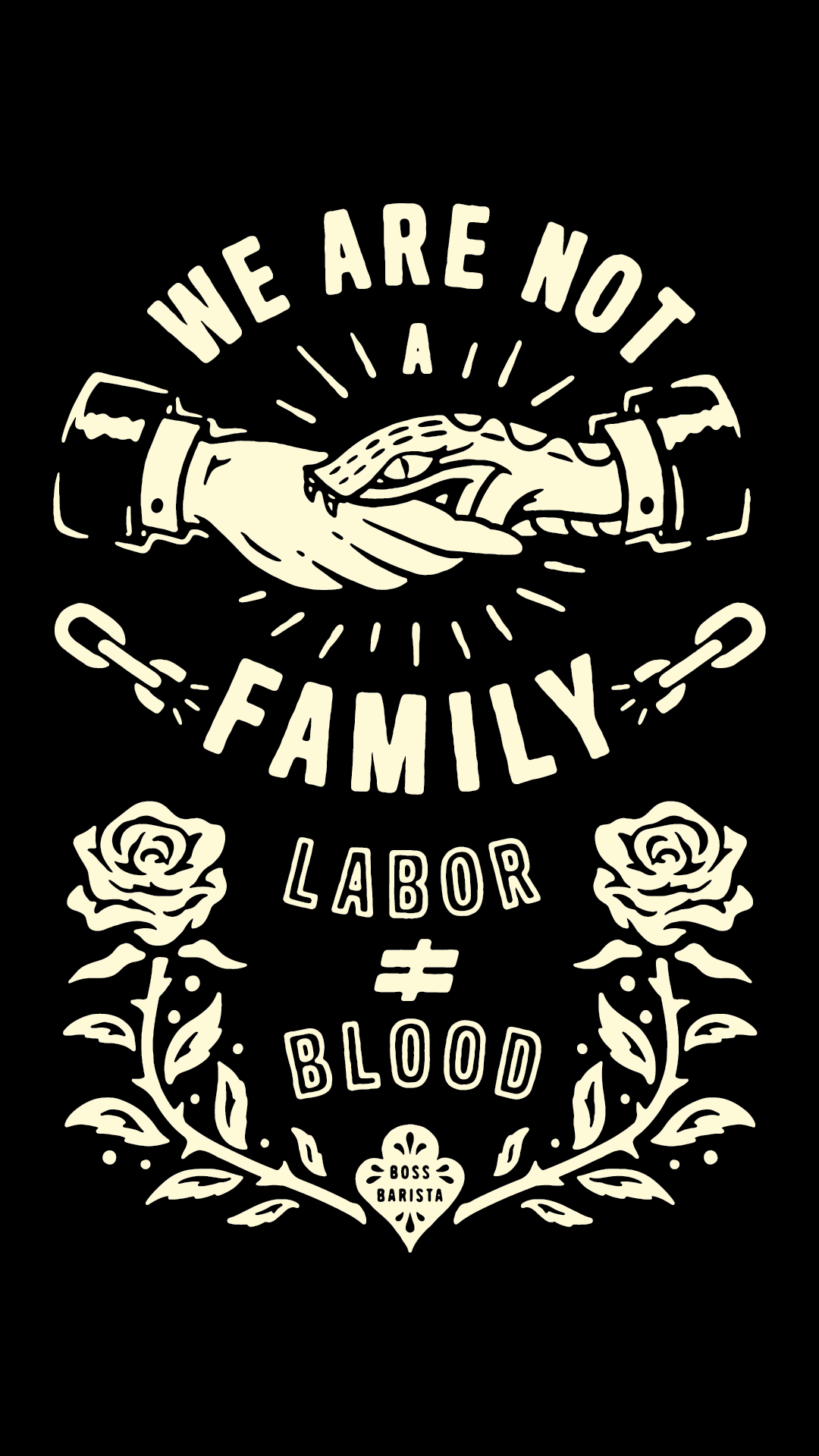Boss Barista is a weekly newsletter and podcast series about workplace equity and employee empowerment in coffee and beyond. If you’re not already subscribed, welcome! I’m glad you found your way here. Before you go, sign up, will ya? Here’s a cute little button to make it easy:
If the following piece resonates with you, consider donating to my Patreon. Pledges of any size help me produce these stories, and your support is gratefully received.
You can like your boss. You can like your coworkers. But don't let anyone tell you you're family.
I’ve always had a problem with the use of familial language at work. For a while I couldn’t quite articulate why, but I knew that every time a boss or colleague employed it, I was left feeling ill at ease.
Eventually, I posted the phrase “we’re not a family” on the Boss Barista Instagram account and was floored by the number of likes the post got, and the 100+ stories that flooded in. It turns out I wasn’t alone in feeling like this language was problematic.
Now, I’m better able to articulate exactly why I hate when leaders use terms like “we’re family here.” For one thing, it’s manipulative and one-sided: The language of family creates a false sense of closeness and security that is often utilized to extract more from employees without reciprocity. For another, referring to employees as family members often forces workers to feel like they have to give more—stay later, work off the clock, hold back on asking for a raise—but demands nothing from employers.
While first probing at this feeling, I did a cursory Google search of the term “work family” and stumbled upon an article by Medium author Mandy Michael, a front-end developer who mostly writes about CSS but who also wrote a knockout piece about how harmful the use of family language is at work. “It’s important to remember that the loyalty and the bond we form with our ‘work family’ often does not go both ways,” she writes. “At the end of the day, if a business is struggling they will let you go, regardless of how much they like you or how difficult it is for them.”
In response to my Instagram post, a lot of respondents articulated similar feelings. “Whenever I’m told we’re like a family in an interview it always puts my guard up. Like at some point they’re going to cross boundaries or require something that’s going above and beyond and not expect to have to reward you or compensate you for it,” one commenter wrote. “Whenever I hear ‘we’re really like a family’ all I really hear is ‘people work much more and harder than what they’re paid for and keep up with shit they’re not supposed to.’ It’s a no for me,” said another. “Ask for a raise or a few days off and they’ll switch up on you with quickness,” one commenter noted.
A few people articulated ideas that I hadn’t previously considered, which helped me map out just how harmful this tactic can be in business settings:
Family language removes professionalism from the workplace. “Professionalism” is a dicey word that’s loaded with racial and gender biases, but in this context, I’ll use it to mean that folks are treated fairly and based on their performance at work. In likening our coworkers and bosses to family members, our leaders imply that we will not be evaluated fairly. As a result, we might be conditioned to let generally frustrating or even harmful things slide, from a boss who never makes a schedule on time to a coworker who is given preferential treatment because they’re close with a manager.
It’s completely appropriate to give grace to our coworkers, and allow them space to make mistakes. But there’s a big difference between accepting a one-off mistake and being forced to accommodate a coworker who repeatedly violates workplace norms and makes doing your job much harder.
You don’t know what someone’s relationship with their own family is like. “Family” doesn’t mean the same thing to everyone. For many, familial relationships are fraught with pain and suffering, and that language at work can trigger emotional responses. Even if one’s work conditions mimic their own family dynamics, that’s not necessarily a good thing.
Family language makes it dangerous to speak out about unfair working conditions. Calling coworkers “a family” is designed to evoke warm, convivial feelings of togetherness. But the flip side is that, if you notice a shady practice or something unfair happening at work, you might be seen as a squeaky wheel: You’re the one at fault for ruining the good vibes.
Being tight with your coworkers is often seen as a substitute for increased wages and benefits. Let’s be clear: A good work environment is not the same as money. Ever.
I think one of the biggest tricks many hiring managers or bosses (perhaps unknowingly) play is downplaying low wages by offering a range of on-site “perks.” The folks from the Slow Bloom Coffee Cooperative, or the former baristas of Augie’s Coffee (before they attempted to unionize), mentioned on an episode of the Boss Barista podcast that many of the baristas were denied wages, and were instead told that the fun work environment was enough. Repeat after me: Feeling warm fuzzies at work does not pay rent.
Relying on workers’ emotional investment to keep your business running is unfair. This mimics my original point, but I want to push this idea further. If you need to depend on your employees being emotionally invested in your company to push it along, then you might be running your business wrong.
Beyond family language, this sort of emotional manipulation also shows up in a range of other phrases and contexts. “We’re a start-up!” or “We’re a really small company!” are examples that, in a weird way, convince employees that they should feel sympathy for their employers. It’s trickery, plain and simple, and masks the fact that as an employer, you can’t keep workers happy by providing them with fair wages and a safe work environment—instead, you have to cajole them into pitying you.
This week, I’ve talked a lot about language. From the interview I did with Areli Barrera de Grodski of Little Waves and Cocoa Cinnamon to my meta-reflection on communicating about communication, it’s clear that words matter. That means we must strive to be clear with our intentions when we communicate—and remember that just because someone isn’t speaking out doesn’t mean they don’t have something to say. Don’t be afraid to get meta, and push beyond what you’re being told or what’s written in front of you. And when someone says, “We’re family here,” think about what that phrase actually means, and why someone might want to use it.
As one clever commenter wrote on that Instagram post, “The only place where you’re family is Olive Garden.”
If this message landed with you, why don’t you put it on a shirt? My friend Cooper Foczsz designed these amazing t-shirts based on the original Instagram post that inspired this message—and all the stories folks told us.
You can buy a shirt as part of our pre-sale right now! We anticipate t-shirts will be ready in 3-4 weeks. You can buy a shirt at cost or throw in a few bucks—a portion of the proceeds will go to hurricane aid in Honduras.
Hold up! You made it to the bottom of this article—thank you for reading! If you enjoyed this piece, you can make a difference by:
Clicking the ‘heart’ at the bottom to say you liked this article
Checking out my Patreon
Sharing this with a friend, on your social media, or anywhere—here’s a button for you to do so:






